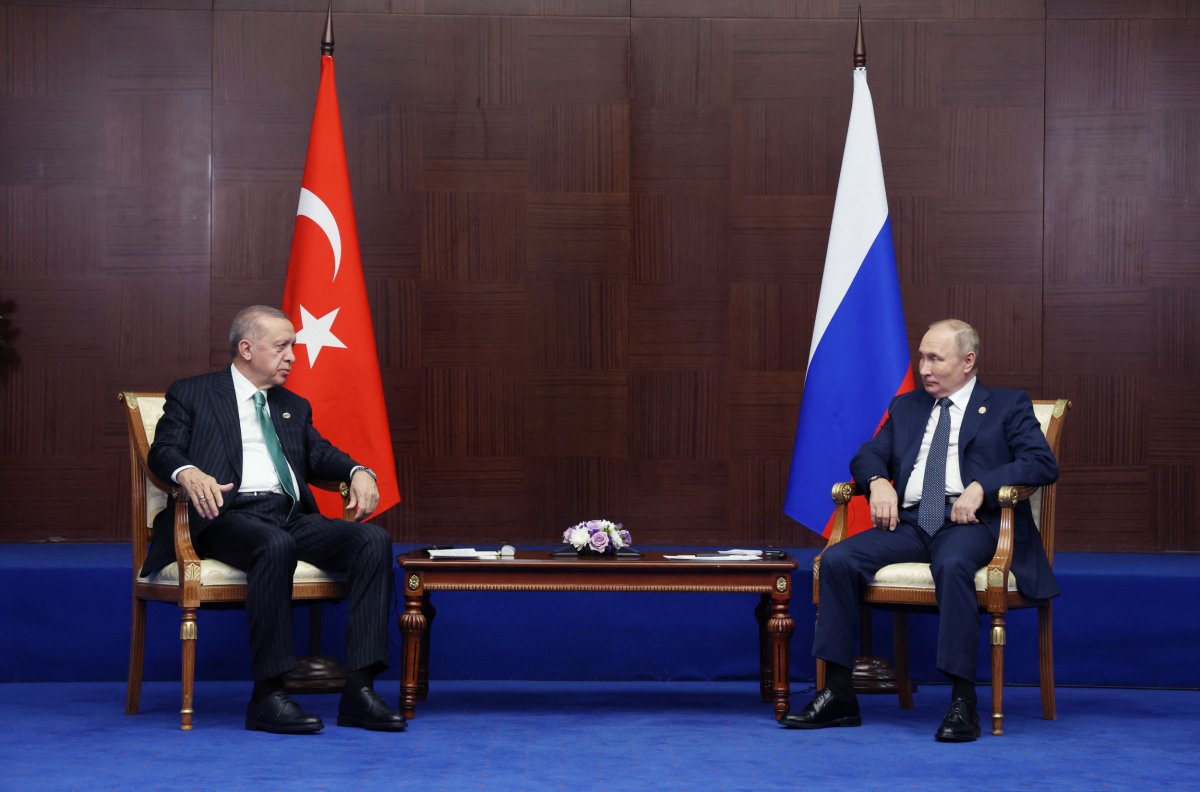Turkish President Recep Tayyip Erdoğan has become the latest prominent figure considered close to Vladimir Putin to seemingly turn his back on the Russian leader.
Stopping the expansion of NATO was one reason Putin gave for his invasion of Ukraine, but the Russian leader now faces an even bigger alliance of 32 members instead of the pre-war bloc of 30, after Erdoğan dropped Ankara's objection to Stockholm's membership on Monday. Sweden is now to join Finland in abandoning decades of neutrality.
Erdoğan's sudden reversal comes just over two weeks after Wagner Group mercenary leader Yevgeny Prigozhin staged a mutiny against the Russian president. It also follows that of another leader who has shown his solidarity with Putin, Hungary's Viktor Orbán.
"Erdoğan might have concluded that betting on Putin after the mutiny seemed less wise," said Atlantic Council fellow Daniel Fried in an emailed comment to Newsweek, adding that the events of June 24 signaled "regime weakness."

The Turkish president has walked a narrow line between opposition to Russia's invasion of Ukraine and maintaining close ties to Putin, even touting his country's "special relationship" with the Russian leader.
Erdoğan refused to join Western sanctions against Moscow (while Kyiv used Turkish-made drones on Russian forces). He also helped the UN mediate with Russia the resumption of grain exports from Ukraine, staving off a potential global food crisis.
"Turkey was never an ally in the formal sense, but it had not joined the embargo against Russia and has been a major trading partner," said Timur Kuran, political science professor at Duke University in North Carolina.
'Turkey Has Humiliated Russia Very Visibly'
Kuran said it was notable that Erdoğan had endorsed Ukraine's accession to NATO, let Ukrainian President Volodymyr Zelensky return from Turkey with commanders of Ukraine's former garrison in Mariupol—Russia said the move violated a 2022 prisoner exchange deal—and dropped its objections to Sweden's entry into NATO, "all in a matter of 72 hours."
"Through these moves and more, Turkey has humiliated Russia very visibly, recommitted itself to the West, and kept NATO united in its opposition to Russian expansionism," Kuran told Newsweek. "In the process, it has compounded Russia's isolation."
As one of NATO's 31 members, Turkey has veto power to block any country from joining, as does Hungary, which had previously sided with Ankara in objecting to Stockholm's bid. Budapest has since signaled it would greenlight it.
Hungary's prime minister, Viktor Orbán, considered Putin's greatest ally within the EU, referred to Zelensky as an "opponent" weeks after Russian forces invaded Ukraine in February 2022. He has criticized sanctions on Russia and his government has refrained from supplying arms to Ukraine. Meanwhile, Russia provides Hungary with energy resources and is involved in the construction of the new Paks II nuclear power plant.
But, in March, Deputy Speaker of the Hungarian Parliament Csaba Hende announced Budapest was expected to vote in favor of Sweden's NATO membership.
'Mixed Messages'
Putin is not only losing allies internationally but domestically as well, as evidenced by Prigozhin's short-lived rebellion in late June. The Wagner boss' rise to recipient of state funds worth billions of dollars was predicated on his close relationship with Putin, whose authority he has now challenged.
Daniel Fried, of the Atlantic Council think tank based in the U.S, noted that Turkey's Erdoğan responded much more harshly to an attempt in 2016 to overthrow him. Tens of thousands of people were arrested following the failed coup attempt. By contrast, Putin met Prigozhin on June 29, after the latter's march on Moscow, according to the Kremlin.
"Erdoğan's reaction to the failed 2016 coup in Turkey showed no such mixed messages," Fried said.
In June, Putin removed one of his top media allies, Sergei Mikhailov from his post as head of state-run news agency Tass.
The Institute for the Study of War (ISW) suggested that the Kremlin was "unhappy with the media coverage of the Wagner Group's armed rebellion and highlights the continued importance of loyalty to Putin over professional achievement."
Newsweek has contacted the Russian Foreign Ministry.
Uncommon Knowledge
Newsweek is committed to challenging conventional wisdom and finding connections in the search for common ground.
Newsweek is committed to challenging conventional wisdom and finding connections in the search for common ground.
About the writer
Brendan Cole is a Newsweek Senior News Reporter based in London, UK. His focus is Russia and Ukraine, in particular ... Read more
To read how Newsweek uses AI as a newsroom tool, Click here.






